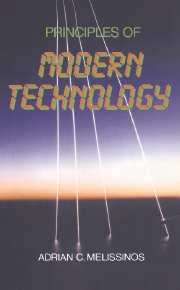Part C - Nuclear energy
Published online by Cambridge University Press: 03 December 2009
Summary
The first sustained nuclear chain reaction was achieved by Enrico Fermi and his collaborators at the University of Chicago on December 2, 1942. Since then, nuclear energy has been one of the dominant factors in our society. Fission reactors are widely used to supplement the generation of electric power and, when it is realized, controlled thermonuclear fusion promises to be an inexhaustible source of energy for mankind. Yet the most decisive and terrifying aspect of nuclear energy so far has been in the production of weapons of unprecedented destructive power. These weapons if used in the large quantities presently available can alter the ecology of the planet and completely destroy, or at the least, radically change human and animal life from what we know it to be today.
In Chapter 5 we begin by discussing the units of energy, the various levels of energy consumption and supply, and the global balance of energy on the earth. The earth receives its energy from the sun, which generates energy by nuclear fusion. Next we review the facts associated with nuclear forces in order to discuss the release of energy in fission and fusion processes. We also discuss radioactivity, its detection and its effect on living organisms. One section is devoted to nuclear reactors and another section to the principles of controlled nuclear fusion. For completeness we also consider solar energy, which even though still economically impractical is an inexhaustible source of clean energy.
- Type
- Chapter
- Information
- Principles of Modern Technology , pp. 163 - 164Publisher: Cambridge University PressPrint publication year: 1990



